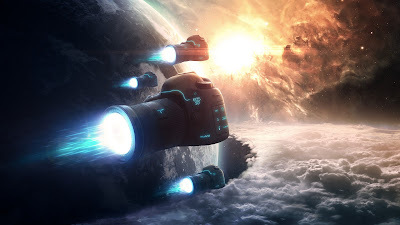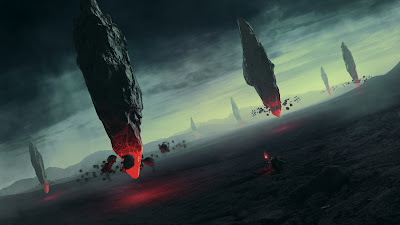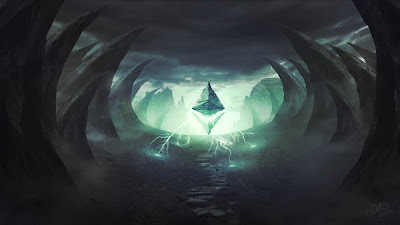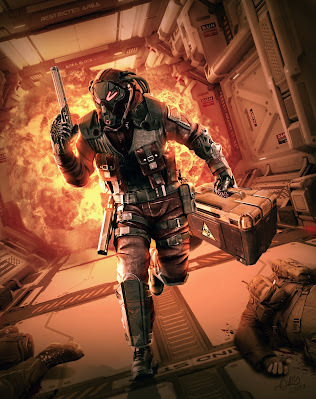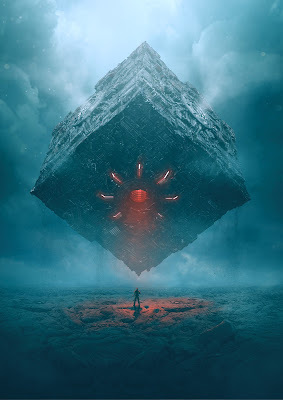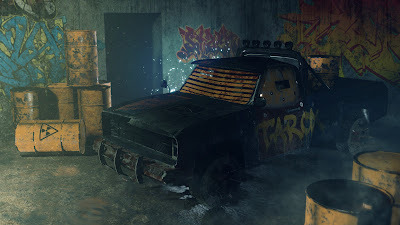Chris Morton's Blog, page 2
November 17, 2022
The Big Trip Up Yonder by Kurt Vonnegut
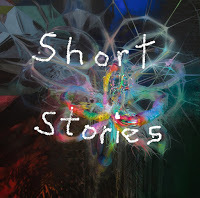
The Big Trip Up Yonder
by Kurt Vonnegut
Gramps Ford, his chin resting on his hands, his hands on the crook of his cane, was staring irascibly at the five-foot television screen that dominated the room. On the screen, a news commentator was summarizing the day's happenings. Every thirty seconds or so, Gramps would jab the floor with his cane-tip and shout, "Hell, we did that a hundred years ago!"
Emerald and Lou, coming in from the balcony, where they had been seeking that 2185 A.D. rarity – privacy – were obliged to take seats in the back row, behind Lou's father and mother, brother and sister-in-law, son and daughter-in-law, grandson and wife, granddaughter and husband, great-grandson and wife, nephew and wife, grandnephew and wife, great-grandniece and husband, great-grandnephew and wife – and, of course, Gramps, who was in front of everybody. All save Gramps, who was somewhat withered and bent, seemed, by pre-anti-gerasone standards, to be about the same age – somewhere in their late twenties or early thirties. Gramps looked older because he had already reached 70 when anti-gerasone was invented. He had not aged in the 102 years since.
"Meanwhile," the commentator was saying, "Council Bluffs, Iowa, was still threatened by stark tragedy. But 200 weary rescue workers have refused to give up hope, and continue to dig in an effort to save Elbert Haggedorn, 183, who has been wedged for two days in a ..."
"I wish he'd get something more cheerful," Emerald whispered to Lou.
* * * * *
"Silence!" cried Gramps. "Next one shoots off his big bazoo while the TV's on is gonna find hisself cut off without a dollar –" his voice suddenly softened and sweetened – "when they wave that checkered flag at the Indianapolis Speedway, and old Gramps gets ready for the Big Trip Up Yonder."
He sniffed sentimentally, while his heirs concentrated desperately on not making the slightest sound. For them, the poignancy of the prospective Big Trip had been dulled somewhat, through having been mentioned by Gramps about once a day for fifty years.
"Dr. Brainard Keyes Bullard," continued the commentator, "President of Wyandotte College, said in an address tonight that most of the world's ills can be traced to the fact that Man's knowledge of himself has not kept pace with his knowledge of the physical world."
"Hell!" snorted Gramps. "We said thata hundred years ago!"
"In Chicago tonight," the commentator went on, "a special celebration is taking place in the Chicago Lying-in Hospital. The guest of honor is Lowell W. Hitz, age zero. Hitz, born this morning, is the twenty-five-millionth child to be born in the hospital." The commentator faded, and was replaced on the screen by young Hitz, who squalled furiously.
"Hell!" whispered Lou to Emerald. "We said that a hundred years ago."
"I heard that!" shouted Gramps. He snapped off the television set and his petrified descendants stared silently at the screen. "You, there, boy –"
"I didn't mean anything by it, sir," said Lou, aged 103.
"Get me my will. You know where it is. You kids allknow where it is. Fetch, boy!" Gramps snapped his gnarled fingers sharply.
Lou nodded dully and found himself going down the hall, picking his way over bedding to Gramps' room, the only private room in the Ford apartment. The other rooms were the bathroom, the living room and the wide windowless hallway, which was originally intended to serve as a dining area, and which had a kitchenette in one end. Six mattresses and four sleeping bags were dispersed in the hallway and living room, and the daybed, in the living room, accommodated the eleventh couple, the favorites of the moment.
On Gramps' bureau was his will, smeared, dog-eared, perforated and blotched with hundreds of additions, deletions, accusations, conditions, warnings, advice and homely philosophy. The document was, Lou reflected, a fifty-year diary, all jammed onto two sheets – a garbled, illegible log of day after day of strife. This day, Lou would be disinherited for the eleventh time, and it would take him perhaps six months of impeccable behavior to regain the promise of a share in the estate. To say nothing of the daybed in the living room for Em and himself.
"Boy!" called Gramps.
"Coming, sir." Lou hurried back into the living room and handed Gramps the will.
"Pen!" said Gramps.
* * * * *
He was instantly offered eleven pens, one from each couple.
"Not thatleaky thing," he said, brushing Lou's pen aside. "Ah, there'sa nice one. Good boy, Willy." He accepted Willy's pen. That was the tip they had all been waiting for. Willy, then – Lou's father – was the new favorite.
Willy, who looked almost as young as Lou, though he was 142, did a poor job of concealing his pleasure. He glanced shyly at the daybed, which would become his, and from which Lou and Emerald would have to move back into the hall, back to the worst spot of all by the bathroom door.
Gramps missed none of the high drama he had authored and he gave his own familiar role everything he had. Frowning and running his finger along each line, as though he were seeing the will for the first time, he read aloud in a deep portentous monotone, like a bass note on a cathedral organ.
"I, Harold D. Ford, residing in Building 257 of Alden Village, New York City, Connecticut, do hereby make, publish and declare this to be my last Will and Testament, revoking any and all former wills and codicils by me at any time heretofore made." He blew his nose importantly and went on, not missing a word, and repeating many for emphasis – repeating in particular his ever-more-elaborate specifications for a funeral.
At the end of these specifications, Gramps was so choked with emotion that Lou thought he might have forgotten why he'd brought out the will in the first place. But Gramps heroically brought his powerful emotions under control and, after erasing for a full minute, began to write and speak at the same time. Lou could have spoken his lines for him, he had heard them so often.
"I have had many heartbreaks ere leaving this vale of tears for a better land," Gramps said and wrote. "But the deepest hurt of all has been dealt me by –" He looked around the group, trying to remember who the malefactor was.
Everyone looked helpfully at Lou, who held up his hand resignedly.
Gramps nodded, remembering, and completed the sentence –"my great-grandson, Louis J. Ford."
"Grandson, sir," said Lou.
"Don't quibble. You're in deep enough now, young man," said Gramps, but he made the change. And, from there, he went without a misstep through the phrasing of the disinheritance, causes for which were disrespectfulness and quibbling.
* * * * *
In the paragraph following, the paragraph that had belonged to everyone in the room at one time or another, Lou's name was scratched out and Willy's substituted as heir to the apartment and, the biggest plum of all, the double bed in the private bedroom.
"So!" said Gramps, beaming. He erased the date at the foot of the will and substituted a new one, including the time of day. "Well – time to watch the McGarvey Family." The McGarvey Family was a television serial that Gramps had been following since he was 60, or for a total of 112 years. "I can't wait to see what's going to happen next," he said.
Lou detached himself from the group and lay down on his bed of pain by the bathroom door. Wishing Em would join him, he wondered where she was.
He dozed for a few moments, until he was disturbed by someone stepping over him to get into the bathroom. A moment later, he heard a faint gurgling sound, as though something were being poured down the washbasin drain. Suddenly, it entered his mind that Em had cracked up, that she was in there doing something drastic about Gramps.
"Em?" he whispered through the panel. There was no reply, and Lou pressed against the door. The worn lock, whose bolt barely engaged its socket, held for a second, then let the door swing inward.
"Morty!" gasped Lou.
Lou's great-grandnephew, Mortimer, who had just married and brought his wife home to the Ford menage, looked at Lou with consternation and surprise. Morty kicked the door shut, but not before Lou had glimpsed what was in his hand – Gramps' enormous economy-size bottle of anti-gerasone, which had apparently been half-emptied, and which Morty was refilling with tap water.
A moment later, Morty came out, glared defiantly at Lou and brushed past him wordlessly to rejoin his pretty bride.
Shocked, Lou didn't know what to do. He couldn't let Gramps take the mousetrapped anti-gerasone – but, if he warned Gramps about it, Gramps would certainly make life in the apartment, which was merely insufferable now, harrowing.
Lou glanced into the living room and saw that the Fords, Emerald among them, were momentarily at rest, relishing the botches that the McGarveys had made of theirlives. Stealthily, he went into the bathroom, locked the door as well as he could and began to pour the contents of Gramps' bottle down the drain. He was going to refill it with full-strength anti-gerasone from the 22 smaller bottles on the shelf.
The bottle contained a half-gallon, and its neck was small, so it seemed to Lou that the emptying would take forever. And the almost imperceptible smell of anti-gerasone, like Worcestershire sauce, now seemed to Lou, in his nervousness, to be pouring out into the rest of the apartment, through the keyhole and under the door.
* * * * *
The bottle gurgled monotonously. Suddenly, up came the sound of music from the living room and there were murmurs and the scraping of chair-legs on the floor. "Thus ends," said the television announcer, "the 29,121st chapter in the life of your neighbors and mine, the McGarveys." Footsteps were coming down the hall. There was a knock on the bathroom door.
"Just a sec," Lou cheerily called out. Desperately, he shook the big bottle, trying to speed up the flow. His palms slipped on the wet glass, and the heavy bottle smashed on the tile floor.
The door was pushed open, and Gramps, dumbfounded, stared at the incriminating mess.
Lou felt a hideous prickling sensation on his scalp and the back of his neck. He grinned engagingly through his nausea and, for want of anything remotely resembling a thought, waited for Gramps to speak.
"Well, boy," said Gramps at last, "looks like you've got a little tidying up to do."
And that was all he said. He turned around, elbowed his way through the crowd and locked himself in his bedroom.
The Fords contemplated Lou in incredulous silence a moment longer, and then hurried back to the living room, as though some of his horrible guilt would taint them, too, if they looked too long. Morty stayed behind long enough to give Lou a quizzical, annoyed glance. Then he also went into the living room, leaving only Emerald standing in the doorway.
Tears streamed over her cheeks. "Oh, you poor lamb – pleasedon't look so awful! It was my fault. I put you up to this with my nagging about Gramps."
"No," said Lou, finding his voice, "really you didn't. Honest, Em, I was just –"
"You don't have to explain anything to me, hon. I'm on your side, no matter what." She kissed him on one cheek and whispered in his ear, "It wouldn't have been murder, hon. It wouldn't have killed him. It wasn't such a terrible thing to do. It just would have fixed him up so he'd be able to go any time God decided He wanted him."
"What's going to happen next, Em?" said Lou hollowly. "What's he going to do?"
* * * * *
Lou and Emerald stayed fearfully awake almost all night, waiting to see what Gramps was going to do. But not a sound came from the sacred bedroom. Two hours before dawn, they finally dropped off to sleep.
At six o'clock, they arose again, for it was time for their generation to eat breakfast in the kitchenette. No one spoke to them. They had twenty minutes in which to eat, but their reflexes were so dulled by the bad night that they had hardly swallowed two mouthfuls of egg-type processed seaweed before it was time to surrender their places to their son's generation.
Then, as was the custom for whoever had been most recently disinherited, they began preparing Gramps' breakfast, which would presently be served to him in bed, on a tray. They tried to be cheerful about it. The toughest part of the job was having to handle the honest-to-God eggs and bacon and oleomargarine, on which Gramps spent so much of the income from his fortune.
"Well," said Emerald, "I'm not going to get all panicky until I'm sure there's something to be panicky about."
"Maybe he doesn't know what it was I busted," Lou said hopefully.
"Probably thinks it was your watch crystal," offered Eddie, their son, who was toying apathetically with his buckwheat-type processed sawdust cakes.
"Don't get sarcastic with your father," said Em, "and don't talk with your mouth full, either."
"I'd like to see anybody take a mouthful of this stuff and notsay something," complained Eddie, who was 73. He glanced at the clock. "It's time to take Gramps his breakfast, you know."
"Yeah, it is, isn't it?" said Lou weakly. He shrugged. "Let's have the tray, Em."
"We'll both go."
Walking slowly, smiling bravely, they found a large semi-circle of long-faced Fords standing around the bedroom door.
Em knocked. "Gramps," she called brightly, "break-fast is rea-dy."
There was no reply and she knocked again, harder.
The door swung open before her fist. In the middle of the room, the soft, deep, wide, canopied bed, the symbol of the sweet by-and-by to every Ford, was empty.
A sense of death, as unfamiliar to the Fords as Zoroastrianism or the causes of the Sepoy Mutiny, stilled every voice, slowed every heart. Awed, the heirs began to search gingerly, under the furniture and behind the drapes, for all that was mortal of Gramps, father of the clan.
* * * * *
But Gramps had left not his Earthly husk but a note, which Lou finally found on the dresser, under a paperweight which was a treasured souvenir from the World's Fair of 2000. Unsteadily, Lou read it aloud:
"'Somebody who I have sheltered and protected and taught the best I know how all these years last night turned on me like a mad dog and diluted my anti-gerasone, or tried to. I am no longer a young man. I can no longer bear the crushing burden of life as I once could. So, after last night's bitter experience, I say good-by. The cares of this world will soon drop away like a cloak of thorns and I shall know peace. By the time you find this, I will be gone.'"
"Gosh," said Willy brokenly, "he didn't even get to see how the 5000-mile Speedway Race was going to come out."
"Or the Solar Series," Eddie said, with large mournful eyes.
"Or whether Mrs. McGarvey got her eyesight back," added Morty.
"There's more," said Lou, and he began reading aloud again: "'I, Harold D. Ford, etc., do hereby make, publish and declare this to be my last Will and Testament, revoking any and all former wills and codicils by me at any time heretofore made.'"
"No!" cried Willy. "Not another one!"
"'I do stipulate,'" read Lou, "'that all of my property, of whatsoever kind and nature, not be divided, but do devise and bequeath it to be held in common by my issue, without regard for generation, equally, share and share alike.'"
"Issue?" said Emerald.
Lou included the multitude in a sweep of his hand. "It means we all own the whole damn shootin' match."
Each eye turned instantly to the bed.
"Share and share alike?" asked Morty.
"Actually," said Willy, who was the oldest one present, "it's just like the old system, where the oldest people head up things with their headquarters in here and –"
"I like that!" exclaimed Em. "Lou owns as much of it as you do, and I say it ought to be for the oldest one who's still working. You can snooze around here all day, waiting for your pension check, while poor Lou stumbles in here after work, all tuckered out, and –"
"How about letting somebody who's never had anyprivacy get a little crack at it?" Eddie demanded hotly. "Hell, you old people had plenty of privacy back when you were kids. I was born and raised in the middle of that goddamn barracks in the hall! How about –"
"Yeah?" challenged Morty. "Sure, you've all had it pretty tough, and my heart bleeds for you. But try honeymooning in the hall for a real kick."
"Silence!" shouted Willy imperiously. "The next person who opens his mouth spends the next sixth months by the bathroom. Now clear out of my room. I want to think."
A vase shattered against the wall, inches above his head.
* * * * *
In the next moment, a free-for-all was under way, with each couple battling to eject every other couple from the room. Fighting coalitions formed and dissolved with the lightning changes of the tactical situation. Em and Lou were thrown into the hall, where they organized others in the same situation, and stormed back into the room.
After two hours of struggle, with nothing like a decision in sight, the cops broke in, followed by television cameramen from mobile units.
For the next half-hour, patrol wagons and ambulances hauled away Fords, and then the apartment was still and spacious.
An hour later, films of the last stages of the riot were being televised to 500,000,000 delighted viewers on the Eastern Seaboard.
In the stillness of the three-room Ford apartment on the 76th floor of Building 257, the television set had been left on. Once more the air was filled with the cries and grunts and crashes of the fray, coming harmlessly now from the loudspeaker.
The battle also appeared on the screen of the television set in the police station, where the Fords and their captors watched with professional interest.
Em and Lou, in adjacent four-by-eight cells, were stretched out peacefully on their cots.
"Em," called Lou through the partition, "you got a washbasin all your own, too?"
"Sure. Washbasin, bed, light – the works. And we thought Gramps'room was something. How long has this been going on?" She held out her hand. "For the first time in forty years, hon, I haven't got the shakes – look at me!"
"Cross your fingers," said Lou. "The lawyer's going to try to get us a year."
"Gee!" Em said dreamily. "I wonder what kind of wires you'd have to pull to get put away in solitary?"
"All right, pipe down," said the turnkey, "or I'll toss the whole kit and caboodle of you right out. And first one who lets on to anybody outside how good jail is ain't never getting back in!"
The prisoners instantly fell silent.
* * * * *
The living room of the apartment darkened for a moment as the riot scenes faded on the television screen, and then the face of the announcer appeared, like the Sun coming from behind a cloud. "And now, friends," he said, "I have a special message from the makers of anti-gerasone, a message for all you folks over 150. Are you hampered socially by wrinkles, by stiffness of joints and discoloration or loss of hair, all because these things came upon you before anti-gerasone was developed? Well, if you are, you need no longer suffer, need no longer feel different and out of things.
"After years of research, medical science has now developed Super-anti-gerasone! In weeks – yes, weeks – you can look, feel and act as young as your great-great-grandchildren! Wouldn't you pay $5,000 to be indistinguishable from everybody else? Well, you don't have to. Safe, tested Super-anti-gerasone costs you only a few dollars a day.
"Write now for your free trial carton. Just put your name and address on a dollar postcard, and mail it to 'Super,' Box 500,000, Schenectady, N. Y. Have you got that? I'll repeat it. 'Super,' Box 500,000 ..."
Underlining the announcer's words was the scratching of Gramps' pen, the one Willy had given him the night before. He had come in, a few minutes earlier, from the Idle Hour Tavern, which commanded a view of Building 257 from across the square of asphalt known as the Alden Village Green. He had called a cleaning woman to come straighten the place up, then had hired the best lawyer in town to get his descendants a conviction, a genius who had never gotten a client less than a year and a day. Gramps had then moved the daybed before the television screen, so that he could watch from a reclining position. It was something he'd dreamed of doing for years.
"Schen-ec-ta-dy," murmured Gramps. "Got it!" His face had changed remarkably. His facial muscles seemed to have relaxed, revealing kindness and equanimity under what had been taut lines of bad temper. It was almost as though his trial package of Super-anti-gerasone had already arrived. When something amused him on television, he smiled easily, rather than barely managing to lengthen the thin line of his mouth a millimeter.
Life was good. He could hardly wait to see what was going to happen next.
You can check out Kurt Vonnegut's wikipedia page here
This story is taken from Project Gutenberg . The etext was produced from Galaxy Science Fiction January 1954. For legal reasons the following statement must be included: ( This eBook is for the use of anyone anywhere at no cost and with almost no restrictions whatsoever. You may copy it, give it away or re-use it under the terms of the Project Gutenberg License included with this eBook or online at www.gutenberg.org).
November 10, 2022
Bookspot - Rememory by Fraiser Armitage
Bookspot - Rememory by Fraiser Armitage
In the future, memory is currency. Felix is broke, on the run, with nothing in his head but a combination of numbers.
Someone robbed him of his mind. Now it's time he took it back.
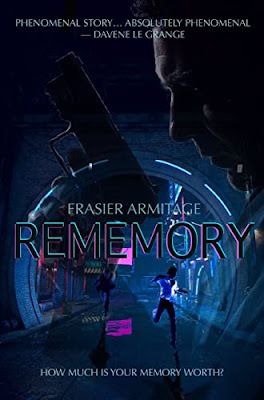
On the run from the law but without any memory of why. This bite-sized cyberpunk novella hits straight in with a pace that doesn't hold up until the end. A fantastic blend of twists and reveals that keeps you guessing all the way.
November 6, 2022
Art - Eric Gagnon
Art - Eric Gagnon
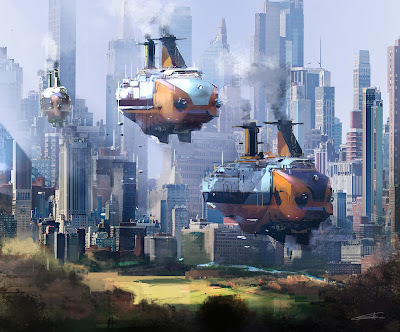
Flying Steam-Ship Arrival
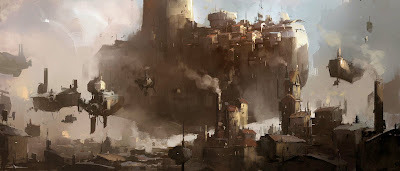
Big Boat Floating Over
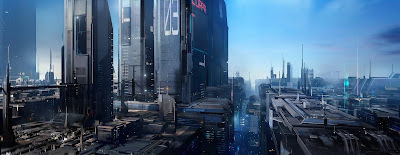
Corpa City 03
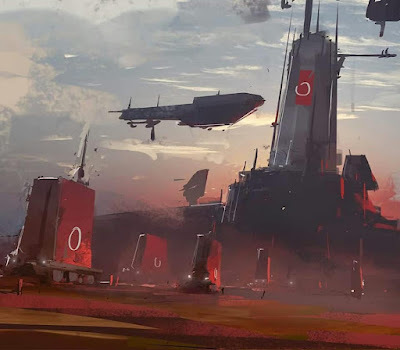
[from] Old Science Fiction Sketches
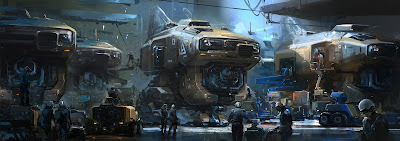
Spaceship Hanger
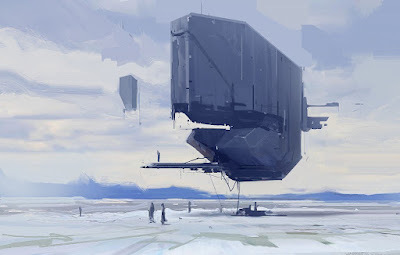
The Cold Halt
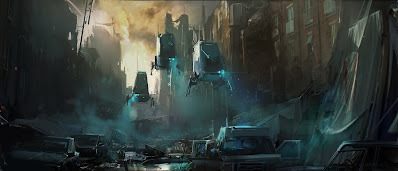
The Sentinel
Check out more from Eric Gagnon here
November 4, 2022
Doctor Mecha

Doctor Mecha
by Chris Morton
Doctor Mecha had been ten years old when he made his first invention. Of course he hadn’t been called Doctor Mecha then. Young Alfred, he’d been. Alfred Junior. Alfred Huang Junior. Son of a pilot, son of a nurse. His parents had a large house on the coast of Dunedin, and at that time a flight to the Motherland took ten hours and was so expensive that even on his pilot’s wages and discount, the father could only afford the family to visit once a year during the summer.
Nevertheless, Alfred had a rather close relationship with his grandparents. In fact he’d been able to recall snippets of memories involving the earliest visits of all; being pushed on the swing, sat in a high chair being fed by his grandmother and even a mountain walk to see wild sheep when he’d dropped an ice-cream and cried and cried, comforted by his grandpa and tasted chocolate chunks for the first time. When he couldn’t have yet been three years old, they’d found him in the outhouse covered in engine oil, cleaned him up and told no one – but he’d remembered this incident vaguely and one day when he was nine, he brought it up with his grandma.
“Black, sticky … was it oil?” he’d asked.
“But … how?” his grandma had gasped. “You must have been only. … How old was he?” she shouted over to the connecting room where Alfred’s grandpa was sat, out of sight as was typically the case.
Alfred communicated with his grandparents using a software programme named Skype-x. A pad called a ‘laptop’ that was basically a screen and keyboard (a dormant pad with alphabet and numbers to ‘key in’) was used for this kind of communication. A video image of the other person would appear on their respective screens. The quality was poor and there were often delays and occasional shut-downs, but before this there had only been the telephone, which meant no visual image at all.
When he was just over ten and a half years old, young Alfred had a brainwave. If he could somehow make the laptop at his grandparent’s house mobile …
He tended to talk to his grandma in her kitchen while she cooked or prepared food. She would often disappear out of sight momentarily. He’d lean at his screen, wishing he could look around to follow her movement. His grandpa would come to say hello for all of five seconds.
Their house was on a riverbank, deep in the Cotswolds. The ground-floor had five rooms; the kitchen, wash room, a spacious living and dining room, another dining room and a toilet. Beside the living room area were double glass patio doors leading to their large flower garden with the flowing river at the bottom.
“If I could just get their laptop to move.”
* * *
In a few weeks he’d rigged up an unsophisticated contraption – it had started off as a box with wheels, remotely controlled with a swivelling top on which the laptop could be attached. The swivelling motion could also be controlled remotely via his computer. He’d downloaded the program needed which worked on the same principle as archaic, remotely controlled toys. Practising in his room, Alfred could command his laptop to move around on the wheels, to twist so the screen could point at all three hundred and sixty degree angles. But then he started to go all out, replacing the smaller wheels with a set of thicker track tires. It could jump down from his desk and land safely to the floor where it moved about the room.
“Mum, Dad!” he’d shouted, once he was ready to reveal what he’d been doing for all those spare hours in his room. “Mum, Dad! It’s finished!”
They’d come in, to witness the scene. The mobile computer shifting about his room like a little toy robot. Their ten year-old son stared up at them, beaming.
“What can it do?” asked his father. Home on leave, he’d been tired, rubbing his eyes. It was six o’clock in the morning and little Alfred had been up all night.
“So this is what you’ve been working on?”
But they’d been interested, they really had. Proud of their little prodigy.
“I’m going to send one of these to Grandma and Grandpa!”
“You’re going to …”
“What’s it for?” asked his mother.
“You’ll see.”
If they had only known where it would lead. If they could have stopped that moment in time; stopped him from getting involved in his new love for robotics.
* * *
That’s what they’d called it: the robot. His grandparents had even given it a face. A little head on a spring attached to the top that would wobble about cutely.
In his little computer body, Alfred could roam the house. “How are you doing, Grandpa?” he’d ask back from his room in Dunedin, tilting the screen to see his grandpa sucking on his vapor.
“My goodness, Alfred,” his grandpa would joke. “Didn’t see you there … creeping up on me like that.”
“Open the doors for me, Grandpa.”
And through the little robot, Alfred would move out into the garden, across the grass and down towards the river.
Sat in his room in Dunedin, Alfred thought about how to improve the device. “Stairs,” he’d murmur to himself. “If only I could build it some legs.”
It could bob down steps easily enough, but getting back up again was an impossibility so far.
“Somebody fetch me out of here!” he’d shout, stuck under a tree root, stuck on his side.
This, however, was not the next update.
On Alfred’s birthday, his parents had bought him a gaming headset. Virtual reality. VR. In those days it was like a wrap-around head-band with a visor; no direct link to the brain. You viewed a screen just like the pad, but with it pushed up to your eyes it could trick the brain into experiencing a full awareness of your virtual surroundings.
The headset was for fantasy games such as Dragon Warriors, Virtual Fighter and other classics. There were virtual sports games … but young Alfred had the idea of linking it up to his computer, the little ‘robot’ that he’d sent to his grandparents. If he could really see through its ‘eyes’, properly experience an awareness of actually being there, at their house in the Cotswolds.
He bought a globe-cam (a globe-shaped device enabling three hundred and sixty degree vision through a complication of built in lenses) and sat with that and the headset in his room, knowing what he wanted to achieve, not yet quite knowing how.
* * *
When Alfred was twelve the second world trade war was at its peak. Further politics had led to poverty in many parts of the Motherland, though with owning a house, his grandparents had escaped the worst of it.
His parents, however, were not so lucky. New Zealand and especially its minor cities had become cornered off from the rest of the world. Dunedin, the southernmost of them all had become a regular ghost town. His father moved to Japan for test flights of the JP-2 jets (space-tourism had been put on hold, although preparations for its inevitable boom were still underway) and not long after this, Alfred and his mother followed.
He was schooled in the Okinawa prefecture, then at fourteen was given the chance of specialising at the Tokyo college of robotics.
By that time the little laptop-come-robot at his grandparents house was moving around with arms and legs. He’d send them updates with instructions on how to assemble the extra parts while at the same time always updating his own model, trying to persuade at least his grandma to use it in the same way he did; sending her the headset and everything, all to no avail. But it was this model he’d entered for an inter-school science competition and it was this that won him the scholarship to Tokyo.
At the age of fourteen, he was the youngest freshman in the history of that college, a record he still holds to this day.
“Our little prodigy.”
His parents had been so proud.
That year, he qualified as the number one student of the college, his team designing a robotic stag-beetle, realistic enough to pass as genuine.
The fifteen year-old Alfred hadn’t visited his grandparents in person for four years, yet when he’d put on his visor he’d be in their house, their world. In the body of ‘Little Alfred,’ he’d roam the town at night.
“Grandma.”
They were in the kitchen.
“Grandma, are you okay?”
Using controls from the gloved pads he was wearing back in their Tokyo apartment, Alfred moved the robot along the kitchen sideboard to where his grandmother was bending over the sink, breathing deeply.
“Grandma,” his voice rang out through the microphone. Little Alfred moved closer, next to her now, it turned up at her face – she’d gone white, she was going to faint. “Grandma!”
“Grandpa!”
“Grandma, hold on! I’m going to get help.”
Little Alfred jumped down from the work surface, made its way to the next room where Grandpa was sleeping, snoring in his favourite chair.
“Grandpa!” screamed Alfred from his home in Tokyo.
He heard a crash from the kitchen.
“Grandpa! Somebody! Help!”
Alfred took off his headset, dialled an international number; emergency services for the Cotswold area. He told them the address. They’d need an ambulance.
When the call finished, he returned to the headset again. Back in the body of Little Alfred, he shifted back to the kitchen to see his grandma had hit her head. Her body was shaking in a disturbing set of spasms.
“Grandma!”
He moved closer to the face on the floor. She was smiling.
“Alfred, my boy.” Her lips large and purple moved slowly, so close to his eyes.
“Grandma, don’t go. They’ll be here soon. I’ve called for help,” he explained, pleaded. “Just hold on. Help is on its way.”
“I love you, Alfred.”
* * *
The death of Alfred’s grandmother (and shortly after, his grandfather) is said by some to have been the driving force for his persistence with the Mecha project.
Without proper funding, the robots Alfred was building in college were never to be more than models. Along came a new wave of financial crash as oil was losing its value and those countries with power held on to their bargaining chips. Statisticians predicted it would take years before the Middle East and Russia would catch up with the Western and Eastern powers. World leaders had become irritable. They wanted soldiers, not doctors. They wanted armies.
They needed protection.
Status.
“Status,” his tutor had said, staring at the seventeen year-old Alfred. “If you quit now, you’ll never build anything.”
Alfred’s design for the robot doctor had been passed from hand to hand, from university to university. It was certainly impressive. There was impact. Revolutionary, the reply had told him.
Alfred had then been called before a board of directors: a company from the Eastern Union.
In a silver room of mirrored walls and thick green carpet, the four men sat behind a wide curved desk in their immaculate suits that spelled money and funding and a career with prospects.
“Controlled from a remote location by an expert, you say?”
“That’s right,” said Alfred. He stood before them with no seat, the soles of his sandals sinking into the carpet. The room was circular and he wondered if it were intentional for him to be feeling this dizzy. Intimidation, he thought. They want something. They need this.He should have been smiling, but sensed something was wrong.
“Controlled, how?”
“I’m sure you’ve read the proposal. My paper,” said Alfred, “explains it all in –”
“Yes, yes, we’ve read the paper,” said another. He coughed, looking across at his three colleagues. “What we want is to hear it in your own words.”
The others rumbled in agreement. They were young, these men. Surprisingly young. Who were they?
“My own words,” the seventeen year-old Alfred repeated.
Another cough, then silence as they waited.
“The robot,” Alfred began. “It is of a humanoid figure. But the hands, they the most important feature. To have successfully replicated the human hand –”
“Yes, yes, we know about that,” one of them cut in.
“Then you see how that breakthrough has allowed, has enabled, opened up … the possibility,” Alfred stumbled, “of creating a force of robot doctors to be sent –”
“A force, he says,” sneered the youngest looking man of the three.
“Let him continue.”
“These models,” carried on Alfred. “They can be posted all around the world. We are finding cheaper ways to build them. The actual materials involved in assembling the droids is relatively inexpensive. The programming simple.”
“How many of them can you build us?”
This question came from the oldest of them and in a murmur. Looking up from the carpet, Alfred stared at the three poker faces. “How … many?”
“An army, you say?”
“Yes, I mean, no, not an army. They are doctors,” Alfred mumbled. “Controlled by … you see, that’s the beauty of it. Sending a qualified doctor to a remote location, his expertise will be needed once every, well I’m not in charge of the stats but all the predicted data is there.” It was Alfred’s turn to cough. “The idea is,” he stumbled, “is that just one doctor can, through the remote manipulator, be in many places at once.”
“At once?”
“No, I mean no, not at once. But a doctor can jump from location to location. Where they are needed. It could revolutionise …”
“Revolutionise what, Alfred?”
But Alfred was staring ahead, all the way past the three of them; he was staring at the future, for he could see it even then.
“This army,” he heard. “Just how quickly can we get production online?”
* * *
Things moved quickly. Doctor Mecha, as he would soon be known as, was forced to sign the agreement.
“Status,” his tutor had said. “I know what you want, Alfred. “But to get a project as large as this one underway, there are short-cuts and there are short-cuts.”
“There’s no other way?”
“Trust me,” his tutor had replied. “If you want these doctors of yours to go into production, it’s better you stay in the project. If you don’t,” he said darkly, “then it could take a lot longer for them to realise …”
“That we should be saving people, not killing them?”
“That,” his tutor replied, “is the nature of humanity.”
But Alfred still didn’t understand. He left the room, left the university. He returned to his parents, to Okinawa. For three weeks he hid from them. It had been a dream. A mistake.
Then two men had caught him on the way home.
“We have the signatures of your friends,” they’d said lightly.
One on each arm, they’d led him back to his home.
“We’ll be seeing you,” they’d said.
On every street corner. In every shop, in every restaurant; outside his window; dark silhouettes on the beach at night. They were there, waiting.
“We’ll be seeing you,” they’d repeat. “Your parents. You love them, don’t you?”
* * *
Some argue it made no difference. That the Eastern Union would have invaded the Baltics anyway. That the loss of lives would have been greater, yet the result the same. By then the Eastern Union was the largest and richest superpower. They had the resources, the numbers.
Doctor Mecha’s robot army spread quickly across Europe. They were giants, controlled from booths in classified locations. Booths packed with soldiers, remotely destroying cities and towns. The opposing armies were human; rebel fighters were human. They had tanks, they had weapons, but the soldiers of the East were expendable and larger in number. The Eastern army of Mecha droids could be repaired; they marched on like ants, swarming nation after nation.
White flags were raised. It was over in months. The Eastern Union controlled half the world’s commerce. They owned half the world’s resources.
The Western powers were quick to negotiate their holding over the Motherland, which remained as a neutral zone of sorts. France and the Scandinavian Union were taken by the Eastern Union while Canada re-joined the West. Africa, along with United Iran joined the East, while the Argentines gave in to Western control.
“Fall in or become our enemy,” was the Eastern message.
“Join the Western powers or give yourselves over to communism,” had been the answer from New Washington.
Alfred’s father had taken early retirement. No longer a test pilot, he revealed to Alfred (who by then had moved in to the adjoining apartment) that the next generation of pilots were already being trained in methods of remote piloting.
“No need for pilots at all,” he’d said over dinner, holding his fork out absently. “Gamers, that’s who they’re employing. Damned kids. Damned …”
He let his fork drop, looked away to the window.
Alfred’s mother took up the plates. Her forced smile hurt Alfred more than he could express. Their politeness, their understanding. They never blamed him, not out loud.
“It would have happened eventually,” his mother said to him, another time when they were in the kitchen. A glass of wine was in her hand. “And anyway, we’re lucky, really.”
“Lucky?”
“To be on this side,” she explained, eyes dazed, unable to meet his own. “You know, you probably did us a favour,” she hiccuped. “If the West had got there first …”
* * *
“So this is it, then?”
“This is it,” replied Alfred.
They were stood in a warehouse. Alfred’s friend, Suki, worked here assembling engine parts for automotives. The room was full of buckles and jacks; wires and belts. In the corner a crate of square watermelons stood out in the space next to a similar stack of super-sized kumquats. Between them a large robot stood in the shadows. From a small window above, rays of sunshine streaked at the dusty air.
It was red and gold in colour with thick arms and torso. Bulky yet agile, with large hands and fingers that were enveloped in replica flesh. Across the robot’s front was stamped the Eastern Union flag.
“And how in the hell did you manage to –”
“Let’s just say I pulled at a few connections.”
Suki looked across, suitably impressed.
“Never seen one this close.”
“You even seen one?”
“You mean in the flesh?”
Alfred laughed. “Flesh,” he repeated. “Don’t tell me, you’re starstruck.”
“Yeah, yeah, I know. I’m a dumbass.”
“Why I brought you here,” retorted Alfred. He was nineteen by then. They both were.
“You have the RCC for this?”
The robot was immobile.
“Controls didn’t come with it,” answered Alfred.
“Wait, you mean …?”
“Don’t worry yourself,” Alfred said, placing a palm on Suki’s shoulder. “It came from a trusted source.”
“A source that could be watching us at this very moment,” answered Suki in a whisper. “How you know it’s not gonna spring into life? Dice us up for breakfast,” he murmured, moving closer nonetheless.
The large robot stood there stoically. Like a tower, a statue. It stared ahead at nothing, this killing machine. The threat of its appearance, Alfred could only imagine what that must be like when the power came on.
“And you’re gonna take it apart?” asked Suki, staring up into the robot’s eyes as though it were more than just a complication of cables, plastic and metal. As though it were listening …
“The plan,” answered Alfred.
When their eyes met, he huffed, not exactly knowing. Gazing around at the dismantled engine parts, Alfred suddenly felt so small. He stared back at Suki.
“You’ll help me.”
“You know I will.”
“It may take some time.”
“Got your back, man. No one else comes in here.”
“No boss that’s gonna –”
“Hey, when it comes to this place, there’s only one boss, and that’s me.”
Suki walked back to Alfred. He took his hand. “You gotta do this, I know.”
“Yeah …”
“Give it hell, dude. You designed it. It’s your baby.”
Just the two of them and the dormant robot. Every day, Alfred would go there. Doctor Mecha taking apart his creation piece by piece. The months wore on while meanwhile the Eastern Union took Canada.
The Western powers were by then building their own Mecha droids. They were larger, stronger, but moved much more slowly. The first Mecha battle took place in Michigan in August 2044, bizarrely becoming more of a sports event than a political fight for territory. The media coverage focussed on the Mecha themselves, comparing design and strategy. Bets were won and lost. Individuals and conglomerates – money was there to be made. The West then came out with a newer, faster model, this one manned by humans sat within the robot bodies of the Mecha. These models proved at first to be superior; despite the loss of human life, the Western powers were fighting back. But the Eastern Mecha were so large in number that it wasn’t long before they had regained their ground. Bets were exchanged again while the Eastern Union moved south to Washington, the whole world watching the live feeds.
“You heard the latest?” asked Suki.
Alfred’s Mecha robot lay splayed across the warehouse in bits.
“Don’t tell me. We’ve taken Hawaii.”
“Not yet.”
“Not yet,” Alfred repeated.
He stood up, hands on hips. A tall, thin twenty year-old. Much taller than Suki, by this time much thinner. Suki drank too much beer. Alfred worked too hard.
“You know, I’ve been thinking,” said Suki.
“I don’t wanna hear it.”
“Just hear me out.”
“I know what you’re gonna say. So don’t. Not you as well. Get enough of this from my parents. Find a job, plenty of opportunities for a young man of your talent.”
Alfred spat on the concrete floor.
“You know, the answer could be in the communications.”
“It’s not the communications.”
“Break the connection, they’re about as useful as this one,” Suki murmured, walking over to an engine he was working on.
Alfred stared at his own engine – at the broken robot. “Too obvious,” he sighed. “Anyway, we’ve been through this before. It has to be –”
“Has to be what? You been at it for a year and what’ve you found?”
“It’s here,” Alfred whispered. “The answer’s staring right at me.”
* * *
Later that night, the two of them sat in the warehouse eating noodles and watching the latest video feed.
“Gotta hand it ’em,” slurped Suki. “Those brutes can sure kick some ass.”
The view on the screen was showing a close up of an Eastern Mecha pulverising a tank from the Western Powers. As they watched, it lifted the said tank up, which by then was a nugget of metal. It lifted it high and threw it across the street-turned-battlefield, then turned to see a Western Mecha running at it full pelt.
The Western model was much larger. It had a human inside, but the human was not visible; though the stance, the posture was much more human-like as it bowled over the Eastern Mecha in the mightiest of tackles.
“You know these feeds are delayed,” commented Suki, waving his chopsticks at the screen. “If that WEB takes out ours, I’m a monkey’s uncle.”
Alfred laughed, appreciating the fact that Suki still had the power to lighten his mood. He stared across at his friend, at his light hands stabbing the chopsticks back into his bowl; watched as he lifted out more noodles that with a flick of his wrist, he’d woven into a ball.
“They don’t use weapons,” Alfred said, looking back at the screen. “They use gloves, gloves made of the hardest steel.”
“You know as well as I do that weapons are useless.”
“Bullets don’t make a dent. Electric bolts are like snacks to them …”
“Lasers?”
“Lasers,” Alfred scoffed, still looking at the screen while like a wrestler, the Eastern Mecha had turned the other onto its back. “Time it’d take to penetrate even the first layer of shielding.”
“So make ’em more powerful.”
“Make them …” And then the sudden realisation.
“Look at their hands,” Alfred whispered.
“Which ones?”
“Ours … our own …”
“Dunno what you mean, they’re not, you mean their gloves? Or you mean –”
“Exactly,” Alfred said, rising unsteadily. “My God, why didn’t I see it before!”
He began pacing the room, his brow furrowed in intensity. He’d gone over to another world. “The hands,” he was mumbling.
“I still don’t –”
“Can’t you see it?!” shouted Alfred.
He turned back to Suki, taking him by the shoulders. “I can destroy them,” he said, eyes now shot with madness. “I can …”
* * *
Alfred’s father came to his room later that night. He’d let himself in to Alfred’s place when Alfred had failed to answer any calls. He’d ascended the stairs, pushed open the door.
“So you’re packing?” he asked, for Alfred was sat in the middle of the room stuffing belongings into a large rucksack.
Alfred looked up, dazed.
“Yes, I mean …”
“You’re going away?”
Unable to meet his father’s eyes, Alfred replied that it was complicated.
The father sat down on Alfred’s soft double bed. He pulled out a stick of chewing gum, tore at the wrapper and began to chew slowly.
“This thing you’ve been working on …”
“What thing?”
Staring down at his son, the father said nothing.
With a huff, Alfred went back to his packing, stuffing in a bundle of socks from under the desk next to him. He moved over to a drawer, sifted through a pile of t-shirts. Looking back at his father, he said again: “It’s complicated.”
“You know your mother and I are very proud of you.”
“You’re very …?”
“What you did.”
Alfred went back to the t-shirts, the hunch of his back at his father. “What I did was cause all of this,” he mumbled. “This, war. This –”
“It would have happened with or without you.”
“But I designed them, dammit!”
Alfred slammed the drawer shut.
“Nobody can blame you. This past year, we know you’ve been trying to put right what you did.”
“Oh, you do, do you?”
“And now you’ve found a way,” continued the father. “We could see it in your face. When you came home tonight. We saw you through the window and your mother said –”
“So what if I have?” huffed Alfred, twisting round, jutting his face up in defiance. These people, what did they know?
“You can destroy them?”
“I can. … Yes,” Alfred relented. “I can and I will.”
He heard his father sigh, watched him chew slowly, grasping for the right words. “We were afraid this day may come,” the father spoke. “You’re an intelligent boy. More than intelligent.”
“Your little prodigy.” Alfred stuffed the chosen t-shirts into his pack. “The prodigy who destroyed the world.”
“Peace will come.”
“Peace?!”
“It will come. Soon. Eventually. One state. One rule.”
“My God,” Alfred spat. “You sound just like them.” This man before him, the greying hair and sad expression. The man who had once beamed at Alfred with such sparkle, so proud.
“Who are you going to give this idea to? The Americans?”
“Maybe.”
“You want to give power over to the West?”
“The West will bring peace.”
“The West will fight back. They’ll want the return of what they’ll say is rightfully theirs. My God, Alfred,” the father cried. “This war could go on forever if you even the balance.”
“How do you know I want to even anything?” said Alfred with forced rebelliousness. “Maybe I’m just a traitor. Could be that I’ll give the Western powers the means to crush us all.”
“Alfred, my boy, we both know that’s not what you want.”
“So what do I want, then?”
“To erase your part in this. To destroy your own Mecha. That’s what you’ve been working on …”
“Suki,” Alfred murmured.
“Not, not Suki. Your mother and I. … You’re our son. We see it in you. The shame, the regret, the … anger.”
“Then you understand,” said Alfred now rising to a standing position. He picked up his backpack. “Be seeing you, Pa.”
“Alfred …”
But Alfred was already out the door. He was off without even saying goodbye to his mother. Or to Suki, the only friend he had, who’d stuck by him.
“Suki,” Alfred hushed, walking through the night; the lit up harbour below him, where his passage was waiting; a boat not to the mainland but to the Pacific island of Guam, still under Western rule.
Alfred had set up a meeting and from there he’d be taken by fighter jet to Washington.
Flying in a jet like his father.
He smiled, coughed and he sang out loud, making his way down the hill to the busy harbour below.
They’d believe him – even then he was with the nickname of ‘Doctor Mecha’ in some reports.
Going over to the other side.
But he’d end it. End it for good.
The hands.
Alfred laughed.
It’d been so damned obvious.
The flesh. The weakness.
“Mr. Huang.”
Alfred turned at the sound of his name. At the formality. At the suit.
“Mr. Huang, I’ve a message for you.”
A thickset man in dark-red business clothes. Sunglasses and the notability of profession. He was holding out a gun, the barrel pointed casually at the easily dressed twenty year-old roboticist looking back at him in shock.
“A message,” the man repeated. But they both knew what was coming next.
* * *
In 2059, the Western Powers finally surrendered to Eastern Union control. In seventeen years the East and their Mechas had achieved total world domination.
Suki was by then married with a second baby on the way. The next generation would learn that the Mecha war had been a revolution. Scholars would say that it had been inevitable and even necessary. A one planet rule.
The Mecha army remained. People were encouraged to call them Peace-bots, or Peas, for short. Their design changed to that of a more cuddly appearance. A matriarchal, watchful eye. Less for intimidation and threat, more of a reminder that peace should remain at all cost. That we had to work together.
Doctor Mecha’s name began to be thrown around in legend. Some say he’s alive even now. Some say it was his parents who sold him out, who notified the authorities when he threatened to betray the Eastern Powers in the hope of stopping the war and bringing about a settled peace. Others say it was his friend Suki, who later, to the contrary, became outspoken in defending the name of his former friend.
A thousand history essays, a thousand debates. If he could have in fact done so, would Doctor Mecha have been right to put a premature end to the fighting?
Very few people died in the third world war. Robots fighting robots. Eastern Power. World control. Victory!
Peace.
Some say we’re living on borrowed time. A poisoned chalice; a corrupt leader – that this is all it would take for the world as it is to regress into a much darker age. That utilitarianism ignores justice.
On every street corner the Mecha robots stare down at us as we pass. They are watching. Listening. Those men behind the machinery in their castles, far away. They care for us, keep us in line.
* * *
A statue of Doctor Mecha stands in New Times Square. He’s bending down inspecting the hand of a first model Mecha droid. The droid too is made of grey stone, though the Eastern Union flag across its front is boldly painted in red and white.
If you gaze at them for long enough you may see the sadness in Doctor Mecha’s eyes. The lanky figure of the roboticist. Lost hope. Confusion. A well meant vision that somehow would never turn out to be quite what he’d hoped.
It’s unknown if the sculptor intended this impression, but many have commented upon it. The sad scientist, they say. And there’s talk of the authorities taking it down, replacing it.
Go see it yourself, while you still have the chance.
Doctor Mecha, the child prodigy who grew up to be remembered as the father of the modern world; whose original design for remotely controlled droid doctors finally came to use during the Great Rebuilding. With no wars, no famine, and disease under control, there is even talk of Mecha droids being sent to Mars; talk among scientists that they could go even further; that the possibilities are endless.
October 25, 2022
Art - Pavel Oliva
October 20, 2022
Come Into My Parlor by Charles E. Fritch

Come Into My Parlor
by Charles E. Fritch
I found Johnny a few blocks from our hotel in a little bar that was nearly deserted. He was sitting alone at a table in a dark corner, staring morosely at nothing in particular, his hand limp around an almost-empty glass. He seemed perfectly sober, though his eyes stared glassily ahead.
I sat down beside him. "What do you say we go back to the hotel, Johnny? Tomorrow's another slave day."
His eyes shifted to me and then back to nothing. I wondered if he had actually seen me.
"We can talk about it over some coffee and a bit to eat."
I suggested, placing my hand on his arm.
"Go to hell," he said quietly and shook me loose. He lifted his glass, drained the last few drops. He held the empty glass to the light, then set it down, regretfully. "But first buy me a drink."
"You'd better go home," I said. "You've had enough."
He laughed harshly. "Look who's giving me orders. I know things about this cock-eyed old world you never had nightmares about, and you're ordering me around! Bossy newspapermen! Go to hell, then; I'll get my own drink."
He rose unsteadily and managed his way to the bar. He came back with the glass full.
"You still here. I thought I told you--"
"You'd better lay off that stuff," I said quietly. "You're not used to it."
"Boy, oh boy, you're just full of orders today, aren't you? Charlie Bennet, boy crusader! Well, I've got something you can crusade about. Anything else you'd like?"
"That's enough for now."
"You're damn right it is. Now get the hell out of here and leave me alone. Can't you see I'm brooding over the fate of the world?"
"What are you so mad about?"
He looked annoyed, and a little startled. "Brother, if you only knew –"
He raised his glass, and then stopped and set it on the table. "Wait a minute. Maybe I ought to tell you. Maybe I ought to let the two of us worry about it, instead of just me. Maybe you should print it in that newspaper of yours."
"I'm willing to listen, anyway."
"Sure! Why not? I'm just beginning to experience that rosy sensation, that warm feeling of camaraderie they keep stoppered up in bottles. It's the only place on this planet you can find it."
"Don't be cynical."
"Maybe I should bust out laughing. The whole thing's really funny; it's the funniest thing I've ever heard."
"We'd better go."
"Sure, let's go. But first – you want to see something really funny? Here."
* * * * *
He took a pair of glasses from his pocket and handed them to me. They seemed like ordinary shell-rimmed glasses, though the lenses were tinted a slight blue.
"Put them on," he prompted. "Go ahead."
"Where'd you get these?"
"Made 'em," he said. "My job is optical research, remember. I was fooling around in the lab with some invisible light experiments. The right combination of lenses and coatings – and whammo! This." He took a drink. "I should have been a lawyer or a plumber or something." He grunted. "Or even a newspaperman!"
"What are they supposed to do-see in the dark?"
He laughed humorlessly. "That'd be a boon for a reporter, wouldn't it? No, my friend, much worse than that. Try them on. Go ahead."
I did. "Well?"
"Notice anything peculiar?"
"The coating makes everything here seem bluish – maybe even unearthly, if that's what you want –but –"
"C'mon outside, then," he said. This time he took my arm and steered me from the bar. I was glad of the opportunity to get him into the night air.
"Look at the sky," he directed. "See anything unusual?" He stood waiting, expectant.
"I see stars," I said. "Nothing unusual about that, is there?"
"Stars! Only stars?" His voice had lost its tinge of sarcasm. His fingers were tight on my arm. "Look, across the sky, see those luminous bands? All across the sky. Like a giant spider web."
I looked again. After awhile, I said, "Sorry, Johnny, but there aren't any luminous bands, spider webs or otherwise. I think we'd better get to the room. A good night's rest –"
"Wait a minute," he cried suddenly, his face pale. "You think I'm drunk –or worse. I tell you there issomething up there. Shining streamers crisscrossing the sky, like –like –"
"There's nothing, Johnny. Only stars."
I took the glasses off. He made a quick grab for them and somehow they fell to the pavement and shattered.
For a moment, Johnny stared at the glittering fragments, his jaws working. "You've broken them," he accused finally, his eyes filled more with sudden despair than hatred. "It took weeks to build them."
"It was an accident," I told him. "But it's just as well they are broken. I tell you, Johnny, there's nothing unusual in the sky. Nothing at all. Spider webs! Next you'll be seeing pink elephants."
Johnny stood in the cool night and stared at the sky. "They're up there, I tell you. They're up there, and I want to know why. And there's one thing I want to know more than anything else; suppose they're really spider webs--" His face was deathly white. "Are there spiders?"
He stared at me insanely in the darkness. "Do you realize what that would mean, Charlie? Giant spiders, invisible, roaming across the Earth!" His fingers were digging into my arm again.
"Johnny, come out of it," I snapped, shaking him. "There is no web in the sky, you hear me? And there aren't any spiders, either. It's just some crazy figment of your imagination. That's all."
"But just suppose there are," he persisted, a little wildly.
"Maybe –maybe it's not just the glasses. Maybe it's partly me, too; maybe I'm the only one who can see them; maybe that's why you didn't see the web. Maybe –"
"Johnny, be sensible! If there were such monsters roaming around, don't you think they'd have been discovered by now?"
"I don't know," he said, helplessly. "I don't know, and it's driving me crazy. You've probably wondered why I haven't slept very well for the past couple of weeks; well, that's the reason. I didn't want to say anything. I hardly dared put the glasses on, I was so afraid. Not of being thought crazy, but – but afraid of what theymight do if they knew they were discovered."
"Look, Johnny. Even supposing you might be right, why wouldn't they show themselves? Why just stay up in the sky in a large web?"
"Maybe they're sizing us up," Johnny said, trembling but not with cold. "After all, we've got a few weapons, too. Maybe a machine gun or an atomic bomb can hurt them, as well as humans."
"Unless they're here for some good?" I suggested.
Johnny laughed. "Spiders? Maybe they're hungry – and they think we're a bunch of flies down here. That's more likely."
"Isn't this –rather fantastic?"
"Of course it is. Why do you suppose I've been keeping quiet about it for the past two weeks? Why do you suppose I'm out trying to get drunk?" He added disgustedly: "I can't even do that."
"C'mon," I said, "let's go to the room and we'll have some coffee. We can talk about it there."
"Sure," he said, and his voice was suddenly subdued. "Sure, why not?"
We went to the hotel room and I made some coffee, being careful to slip enough sleeping tablets in Johnny's cup. In a few minutes he was sprawled across the bed.
I went to the window and looked at the glowing beads of traffic below. I looked at the sky –at the stars. Spiders in the sky; what a story that would make. The editor'd slap me in the booby hatch if I ever handed in a who-what-when-where like that.
When I left for work the next morning, Johnny was still snoozing. Let him sleep it off. Do him good. He'd been working too hard at the lab, anyhow.
I couldn't get back to the hotel room that morning, though I wanted to see if Johnny was okay. I was pretty busy writing a human interest yarn kidding the pants off some astronomer's notion that light waves coming from certain portions of the sky were being deflected or refracted slightly for no discernible reason.
The amount of difference was microscopic, and I wrote it up to emphasize its ridiculous splitting of hairs and the fact that you can't take some of these crackpots seriously. Here the world is on the verge of coming apart at the seams, and they worry about wayward light rays.
During the afternoon, I managed to drop into the hotel to see if Johnny had slept off the liquor and the sleeping tablets. He had, and he was sitting on the edge of the bed, looking grim – and a little perplexed.
"How ya feeling, Johnny?" I said.
"Great," he said, though he didn't sound it. "Things seem a lot clearer this morning."
"Good. I thought they would. You know, you really had me going last night. I thought you meant all that stuff, but I guess imagination and a few beers can do a lot."
"Cut the kidding," he said grimly.
"What?"
"I said, cut it. I'm not in the mood."
"Now what's the matter?"
"This," he said. He held up a pair of glasses, twins to those destroyed.
"But –how could you have made another set? You haven't been near the lab today."
"When I first discovered this web business, I made two pair of glasses. I figured two people could do something about it a whole lot easier than just one. But I was afraid to let anyone in on it. I thought maybe I wasbatty."
"So?"
"I made this pair for you. For you, Charlie, so you could write the stuff up in your paper to let people know. That's a laugh, isn't it?"
"Say –that's swell. But –"
"Stand back!" Johnny cried suddenly, as I started to move toward him. He snatched a gun from beneath a pillow and waved it threateningly. "Know what I was doing this afternoon before you came in?"
"Johnny, this is crazy! Put down that gun and listen to reason."
"I had the glasses on," he continued, "and I was looking out the window here. I'm getting real brave – even in broad daylight – but there comes a time when you just don't care. I saw spidersin the streets. Huge spiders walking along the streets, mingling with human beings. And get this, Charlie –when I took the glasses off, they were like human beings. Like humans, you understand. You know what that means? They're in disguise all around us!"
"That's not true, Johnny," I insisted. "There are no webs in the sky. There are nospiders. It's your imagination. The strain. Working in the lab –"
"No," he cried, and the gun never wavered. "You know what else I saw? A few minutes ago. I was looking down into the street, and a spider got out of a car just in front of the hotel here and started coming in. I took off the glasses to see if it might be someone I knew."
He began to laugh hysterically. "You know who it was, Charlie –"
I leaped forward, trying to knock the gun down. But Johnny's hand came up, and the gun jumped, spurting noise and flame. The bullet slammed into my body.
Desperately, I drove forward. My arms went around him. The gun went off again, before I could prevent it. A furrow of pain shot across my stomach, and I shrieked out in sudden anguish.
"Johnny, Johnny. Stop it. Stop!"
I struck his hand. The gun clattered to the floor. He was struggling frantically, striking out against me with doubled fists. His shirt was splattered with my blood. He gasped, clearing his lungs for a scream.
There was nothing else I could do. The life was draining from me.
I held his arms and legs together and tried not to look into the terrified expression crossing his face. I held him tightly while he squirmed in helpless frustration.
And with my two remaining arms I strangled him!
You can check out Charles E. Fritch’s wikipedia page here.
This story is taken from Project Gutenberg . The etext was produced from Science Fiction Adventures Magazine February 1953. For legal reasons the following statement must be included: ( This eBook is for the use of anyone anywhere at no cost and with almost no restrictions whatsoever. You may copy it, give it away or re-use it under the terms of the Project Gutenberg License included with this eBook or online at www.gutenberg.org).
October 12, 2022
Spaceman's Luck by George O. Smith

Spaceman's Luck
by George O. Smith
A flare of light arced upwards and moments later the shattering report dinned in the ears of the crowd, rolling across the field like thunder. The noise covered the sharply indrawn breath of ten thousand people. A sonorous voice amplified a millionfold announced: "X Minus Fifteen Minutes!"
There was a second or two of absolute silence and then the waiting crowd let out its breath all at once in an audible sigh. They wiped their glasses nervously, or poised their binoculars, or scratched their heads for the last nervous time, hoping that they would not sneeze at the improper second and so miss the takeoff; it would be over just about that quickly.
Out across the field, the focus of ten thousand pairs of eyes, stood the Lady Luna. She looked small from the crowd, but the three men who stood at one tail-fin were dwarfed by her size.
"This is about it, Gordon," said the oldest of the lot.
Gordon Holt nodded. "I've about five minutes yet," he said nervously.
The middle-aged man said, "Time for a last cigarette, Gordon."
Holt shook his head. "Not after training to do without for six months. Save it until I come back."
Doctor Walsch nodded. "That's good sense, Gordon. We'll be waiting for you. How do you feel?"
"Fine. Just a bit jumpy."
"You ought to feel as fit as a Guarnerius. You've been trained and you're trim and fit. I doubt that you'll ever feel any better in your life than you do right now."
General Towne nodded. "Don't forget the honor, either," he said. "The excitement should give your high feelings another lift. Imagine being the first man to ever set foot on the soil of another world."
"It's a bit of a sterile world, I'm told. Not much more honor than the first man to put his sandal on the top of Pike's Peak. They sell postcards there, now."
"Too bad we've named all the visible Lunar Craters," said General Towne. "Seems to me that some signal honor--well, anyway, Gordon, we'll name a big one on the other side after you."
"It –"
A siren wailed and Holt jumped. "That's it," he said.
"Good luck, Gordon," said the general, wringing the spaceman's hand. The doctor clapped Gordon on the back as he turned away.
Doctor and general got into the waiting jeep, and the driver turned and called, "Don't take any wooden moonbeams up there, Holt!"
Holt shrugged noncommittally and climbed the ramp into the spacelock. He sneered at the crowd beyond closing spacelock.
"Wooden moonbeams?" he said aloud. "Oh brother!"
He went to the control chamber of the Lady Luna and ran through his checklist almost mechanically. He waited almost breathlessly until the radio barked the word that told him to hit the ignition switch, and when it came he hit it with a vigor and enjoyed the crushing sensation that followed. The thunder from below was music in his ears; now he was on his way and they wouldn't call him back.
Holt was no mere glory machine. Not for him was the simple honor. He had it planned, had it planned from the moment he was selected.
For Holt, the honor of setting the first foot on another world was a flat and tasteless award. It would last only until someone else did something slightly better. What could he get out of driving a space rocket to Luna? Not a hell of a lot. He was not headed for an adventure and he knew it; with everything precalculated, including the risk, what adventure could he have? To land and collect a quart of pumice and a pound of rock and maybe a shiny stone. Look for lichen or moss. Listen to the Geiger.
This sort of dry action would sell no books, collect no royalties, make no moving pictures, bring in no dough.
Gordon took a deep breath as soon as the motor cut off. He was on his way and he knew how to handle everything from here on in.
He had seen enough of human nature to foresee it all. A slight mishap and a call for help would start it. A landing just hard enough to bend the control vanes or to plug up the rocket exhaust. Maybe to dinge up the spacecraft enough to make it unspaceworthy. Then –
The cry for help and the whole world crying in return that a Human Being was marooned out there, helpless and alone.
They'd come.
They'd turn handsprings to get out there. Time and money would be tossed down the drain, and men would strive and women would cry, and the news would be filled with daily columns of how the rescue was progressing.
Drop a man in the ocean and the navies of every country go out and comb the sea to find him. Put a cat on the telephone pole and three hundred people struggle to get the animal down. Drop a child in a well and the countryside turns out en masse to help.
Well, maroon a man on the moon and watch 'em struggle.
He had air for ninety days and food and water and just about anything a man would need. He could sit it out and he knew it. And he knew that there was a second rocket that could be put in space within a couple of months. Sixty days he'd sit it out and then –
It would be the story of his life, the tale of his rescue, the bright lights and the personal appearances. Radio and television and endorsing this junk and that googoo. Women and liquor and money.
* * * * *
He came down in the Crater Plato, tail first but far too fast. The tailfins crumpled and the sifting pumice drove up into the exhaust and packed like cement. A seam whistled far below to let out some air from a sealed compartment, cracked in the bump.
The crash staggered him a bit, but all he suffered was a nosebleed and a set of sprained chest muscles. He sat up and looked around.
The radio. He snapped it on and called: "Lady Luna Gordon Holt reporting. Made a crash landing. May be dangerous. Will check and call at 0300."
He eyed the radio thoughtfully; it only took about three seconds for an answer, but in that time Gordon considered smashing the radio in the middle of the next broadcast and then discarded the idea because it might lead people to think that he, too, had been smashed. Gordon wanted to be rescued, not given a hero's brief hail and farewell.
"Calling Lady Luna. Holt! Are you all right? Explain!"
"I am all right. I am not hurt. Crash landing rather rough but nothing broken. No air leakage, nothing completely ruined that I can tell. Landed as per program in the dead center of Plato, but a little too hard."
That ought to do it. Let 'em get excited slowly. They'll forget me less slowly.
"Lady Luna what happened?" They were worried.
"I don't know. I have a hunch that the pumice does not provide a true ground-plane for the radar. We landed as though the ground were about thirty feet below the surface."
* * * * *
That sounds logical. Such things are entirely possible, I'm told. Powdery, filmy stuff with no water shouldn't have a firm ground-plane.
"Lady Luna inspect your damage and report as planned at 0300."
Holt checked his air first. Plenty of it. Not a bit gone. Water next and food next. He checked the hull as well as he could from the inside and then went out in his space suit to view the damage.
He had done an admirable job. The tail fins were bent messily and the hull was crumpled a bit just above the place where the rocket motor ended. If this ship took off –
"Lady Luna calling home. Reporting as per plan. Hull bent, tail fins ruined. Crater filled with powdery pumice and I feel that the exhaust is packed. Shall I try a blast to clear it?"
While he waited for the answer Gordon found a bit of wire and shorted the battery for a second. He had to fade out slowly enough to fool them completely.
"Lady Luna, do not try a clearing blast. You'll explode. Wait for instructions."
"Will do. Will do."
He shorted the battery a couple more times and watched the voltmeter drop.
"Lady Luna can you dig down to the exhaust port?"
"Will try. Note battery dropping. Nothing else in danger. Food, water, air all okay. Hull sound but battery dropping."
* * * * *
Seconds went on and Holt could see the resources of the entire world collecting to prepare the First Spacewreck Rescue. Complete with video, reporters, clergymen, politicians, and humanity waiting.
"Lady Luna repeat. You are fading."
Holt repeated, insisting that he was all right. "I can stick it out. I can stick it out."
He watched the radio battery fade.
Let it fade. He could stand the silence for two months until rescue came.
* * * * *
A billion people listened to his voice die away. And when their radio networks went dead, they raced to their telephones and clogged the land wires demanding that something had to be done.
Congressmen gave speeches and clergymen spoke and doctors gave opinions and scientists differed. A government seldom known for its cooperation announced that its new atomic-powered rocket was about to effect the rescue single-handedly. But the atomic part blew up in front of the video cameras and took some of the landscape with it. The Council of the United Nations called a meeting. The newspapers and networks covered everything.
A man known for his brilliance came on the air.
"The batteries of the Lady Luna have run down," he said. "We must get there in less than ten days."
They tried to do it.
A second rocket exploded in France.
A third blew up in Germany.
The fourth would not be ready for space for sixty days.
That was seventy long days after Holt's landing.
Without a miracle, Holt would be dead, even if the experts were wrong.
Protestants prayed, Catholics crossed themselves, and Mohammedans called it kismet and let it go at that. A scientist suggested that since there was no habitable planet in the solar system and that mankind could never reach the stars, there was small point in this effort to make space travel pay off. An economist computed the sum of money shelled out already and called it damned foolishness. A Senator Maculay suggested that taxes could be lowered if such expenditures were cut out.
And ten days after the accident there was a world-wide prayer said for Gordon Holt.
* * * * *
The other rocket at White Sands grew cobwebs in its empty fuel tanks.
And the Lady Luna slipped into the dark of the moon. It grew colder and colder as time went on. …
This story is taken from Project Gutenberg . The etext was produced from Science Fiction Adventures Magazine February 1953. For legal reasons the following statement must be included: ( This eBook is for the use of anyone anywhere at no cost and with almost no restrictions whatsoever. You may copy it, give it away or re-use it under the terms of the Project Gutenberg License included with this eBook or online at www.gutenberg.org).
Bookspot - Behind Blue Eyes by Anna Mocikat
Bookspot - Behind Blue Eyes by Anna Mocikat
Since it was released two years ago, this new cyberpunk has been growing in popularity on the undergraound scene. With all the makings of a classic, if you're into the genre, Behind Blue Eyes ticks all the right boxes.
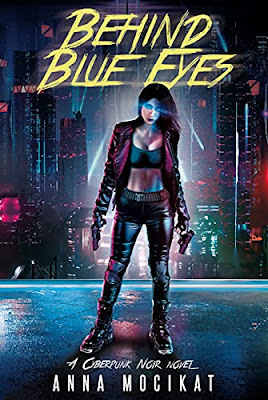
As a powerful, cybernetically enhanced elite soldier her job is to do all the dirty work for the mega-corporation she belongs to. She and her elite cyborg squad are deployed on the most dangerous missions – to protect Olympias from threats outside and inside at any cost.
One day, a malfunction in her implants separates her from the all-controlling grid. For the first time in her life, Nephilim is free.
She learns that everything she has believed in all her life is a lie and decides to defend her newfound freedom.
But Metatron, the leader of her unit, has very special plans for her future and won’t let her get away.
Soon, Nephilim finds herself hunted by the killer squads she once belonged to. She’s the best of them but will her skills be enough to survive?
Blade Runner meets John Wick with a badass female lead!
September 18, 2022
Art - Eddie Mendoza
Art - Eddie Mendoza
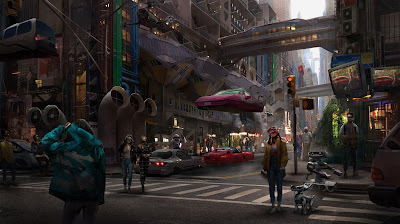
2099
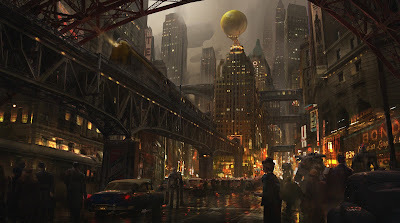
Atlas Plaza
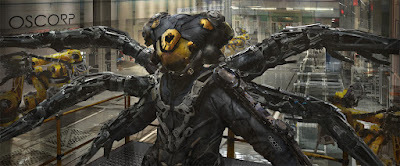
Dr Octopus
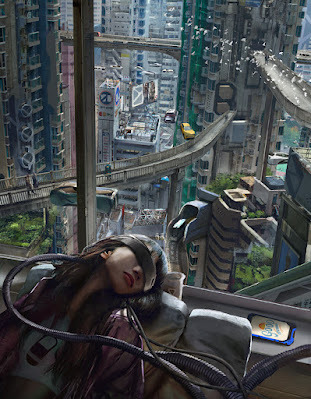
Electric Dreams

Hydroponix
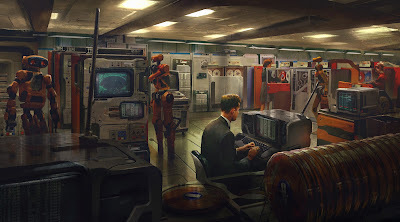
Information Age
For more by Eddie Mendoza, check out his artstation page here
September 7, 2022
The Short History of Dogs by Howard Loring
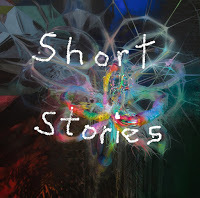
How It All Started
Or
The Short History of Dogs
The young upright man, in reality still only a boy, had smelled the cooking meat from quite a distance. It was compelling. The wafting aroma was mesmerizing, faint at first but unmistakable, growing only stronger with each tentative step that he took, tearing away at his empty stomach, forcing him ever forward.
Finding himself in unfamiliar territory, the youngster was understandably leery, but also being very hungry he continued through the thick underbrush with a determined purpose, in an unending quest. He knew he had to find nourishment or he would die. Then who would tell his strange story?
He’d eaten little the day before, too agitated by the gathering to come, for it was the first such endeavor that he’d ever been permitted to accompany. Due to his age, before this his never-ending chores of toting water from the river, or dragging tree limbs for the ever-present fire had always been in close proximity to his clan’s current, well-defended enclosure. No excitement there, to be sure.
Of course, the youth had often longed to join in one these gatherings, seemingly a hopeless wish, given his tender years. Still, he dreamed of the day for it was his undeniable path, as it was for each of the clan’s boys. His time would come.
Then, on one of his last wood collecting expeditions he’d found a heavy branch that made for him, with little augmentation, a fine club. All of the mature upright men had admired this new weapon, hefting and swinging it, testing its strength and balance. Each had been impressed by the unexpected discovery.
His uncle, headman of the clan, was most pleased, taking the find as an omen predicting a plentiful gathering. As a consequence, he allowed his nephew to join the upcoming venture. Sadly, this snap assessment had proved a mistake.
All gatherings were, and always had been unpredictable things, the outcomes ever in doubt. Still, the clan’s most recent location was extremely bountiful and of late all such expeditions had indeed been successful. Each time the upright men had returned from them both cheerful and fully laden with meat.
The gathering party took to the great river before dawn, paralleling its meandering path, following the clan’s standard operating procedure. Several times along the way the uprights noticed promising footprints of the four legs at the water’s edge, an event that engendered much excited interest. However, nothing came of them as they petered out once the ground became firmer inland from the river’s bank, and so the determined party had returned each time to its previous route.
Gathering from the four legs was the best possible scenario for they could be beaten off their kill with little trouble. Often this kill was a large animal. The four legs were formidable, always hunting in numbers that employed coordinated attack, and this strategy was highly effective in bringing almost anything down.
Yet, if they were attacked with sufficient preparation, successfully employing the tactics of surprise and overwhelming forces, the four legs would quickly relent and run off. The gathering party would then divide their efforts. Some would butcher while the others stood guard, encircling the kill, protecting the periphery of the grisly action.
The four legs always took a dim view of this, of course. They never retreated very far at first, but hung at a distance growling and snapping at each other in their displeasure over losing their kill. At some point though, compelled by hunger, they would be off in search of more game, and often this occurred before the meaty prize had been hacked into smaller pieces suitable for transport.
Other hunters in the area, such as the deadly long claws, were not so obliging. They were to be avoided at all times, for backing down and running away wasn’t in their fierce nature. No, they attacked to protect their kill, and they were much larger, highly aggressive and so more dangerous than the four legs were.
Fortunately, their deeply resonate growl and loud, piercing cries could be heard at great distance and usually the ferocious creatures could be given a wide berth. Of course, this was not always possible and chance meetings sometimes occurred. When they did, the standard outcome never favored the upright men.
The long claws had very long teeth, too.
The clan’s ancestors had learned all these hard-earned lessons well, ages ago in the olden times. They hadn’t been forgotten in the great interim since. Many well-known and oft repeated stories told of such horrifying encounters.
No, the four legs were clearly the best choice and the clan always preferred gathering from them, but where were they now?
Late in the day and far from home, the weary upright men turned a sharp bend in the river only to find there a large horned one lying dead on the bank. Nothing seemed to be near it, although it was evident that the fresh carcass had been fed upon. The group advanced with alacrity to investigate, but only when they were up on the beast did the shocking truth become known.
Behind it, shielded by its very size, rested two sleeping cubs of the terrifying great one of the forest. This was a most surprising turn having frightening consequences, for before the upright men could react, the cubs’ mother broke from the nearby scrub. Very large and bristling, she was already snarling in anger at this intrusion, berserk now in her attempt to protect her young ones.
The startled group of gatherers was no match for her massive claws and great bulk. Several of them were immediately mauled before they could move away, and more were quickly run down and dispatched as her cubs, awakened by the unknown sounds, began crying loudly in fear. This event propelled their mother into a true frenzy, and she viciously lashed out unhindered by any thought, fueled only by her terrible rage.
The young upright boy, proudly clutching his fine new club, had been among the first gatherers to reach the dead horned one. Soon he was caught with a tremendous, backhanded blow from the giant, swinging paw of the great one of the forest, who was madly thrashing about consumed by her impassioned slaughtering. It was as if a tree had hit him, and he was thrown unceremoniously into the great river.
This alone had saved him.
Of course, the youth couldn’t swim, none of the upright men could. The always churning and never-ending river was very much viewed as a mystical thing by the clan, and so they had yet to even learn how to fish. But the boy, stunned, had nevertheless somehow floated to a passing log that bore him downstream, and thus away from the horrid carnage still viciously transpiring on the now overly-bloodied and gory bank.
After some time of desperately clutching about the log, he was rudely deposited ashore after his transport was beached while traversing a long bend in the river. The exhausted youngster had pulled himself further up on the bank and collapsed in a heap. It was then that he smelled the cooking meat in the distance.
Naturally the boy was unsure of his location, but that didn’t matter. He had to eat soon or he would never live to find his way home, if that were even possible now. He began to move, honing in on the enticing scent of roasting flesh.
Evening was near, and approaching swiftly. Soon he wouldn’t be able to discern anything in the quickly growing gloom. Next, however, he saw the piercing light of a fire in the distance, shrouded by the surrounding forest.
The calling aroma was strong now. It turned his empty stomach into knots. He crept closer taking care to move as quietly as he could, always forward towards the illumination beyond, which at this point was enveloped by the deepening darkness.
At last he could see the entire scene through the underbrush. A fine campsite had been laid in a small clearing rimmed by huge boulders. A giant fire, blazing away, cast flickering shadows against the rocks and shrubbery around them.
He saw no one about. It seemed the whole area was deserted. He did see the meat though, sizzling on a spit very near the fire, a huge hunk dripping tasty fat.
Who would leave such a treasure unattended?
Instinctively he reached for his sharpened butchering stone, a most valued object that everyone carried during a gathering, a highly-prized implement carefully chiseled with precision to fit the owner’s hand. He found it missing as was, of course, his fine new club. He should have realized that the unforgiving waterway had already swallowed both of his precious tools.
The young upright man next judged himself not only lost and alone, which he was, but now totally weaponless as well.
Yet here he was wrong.
His finest instrument, possessed by every member of his clan as well as those scattered about like them, had been minutely honed through time itself, from the very beginnings of his kind. It was a natural development unique to the now fully defined species, and no other living thing possessed it. Nothing came close, not even the lumbering, flat-headed men in the area who were generally so similar in other ways to the uprights.
This singular, superior weapon, at present being furiously employed to assess the situation, was his very large human brain.
This particular circumstance, however, was difficult to understand. Where was the owner of the meat, he wondered? And why had they left such an item unprotected?
Upright men cooked their food, of course, but they weren’t the only ones to do so. The flatheads had fire as well, and they, according to the clan’s ancient lore, were the ones who’d first unlocked its hidden secrets. And they could be fearsome.
At last he could stand it no longer. He broke through the brush and dashed to the spit, thinking only at first of grabbing the roasting meat and beating a hasty retreat. Yet, after laying hands on the greasy haunch, he instead had a much better idea.
The boy sank to his knees and bit into the still sizzling flesh. Nothing had ever tasted so good to him, and he moaned in delight as the succulent juices dripped down his face. Despite his earlier trepidation, he sat by the fire and ate with gusto, unconcerned now with what might happen next.
After savoring several mouthfuls he reconsidered, thinking again of dashing off with his purloined meal, but he didn’t. He was so exhausted he found that he couldn’t move, only concentrate on the task at hand. He reasoned if the food’s owner did return and killed him, well at least by then he’d die with a full stomach.
While munching away, he heard movement in the brush, the sound of someone approaching. The youngster, still chewing as fast as he could, sat in place and awaited his fate. At this stage, no other viable option was left open to him.
An upright man then appeared, but unlike any that he’d ever seen before. He was very tall, as tall as a flathead, but unlike them he was thin and dressed in a bizarre fashion. He wore no stitched animal skins but some kind of covering that aside from his hands and face totally wrapped him, clinging tightly to his body.
“Welcome,” he said, but the boy didn’t respond.
The newcomer then held out his arms, his palms open and pointed toward the youngster, who had stopped his mastication at the action. After a few seconds, the strange upright man dropped his hands. Then he smiled.
“Welcome,” he said again, and this time the interloper replied.
“I’m hungry,” the young boy related, as if that would explain everything. It did. The upright man smiled again, and then sat on a large stone at the edge of the firelight.
“I know,” he answered. “I cooked it for you. I knew that you’d make your way here, to this clearing, tonight.”
The boy’s eyes opened widely as he considered this. Could it be so? Then with a shrug he commenced his meal, knowing now that no immediate danger awaited him.
Yet, after swallowing his latest mouthful, he asked, “How?”
Now the sitting man considered. He rearranged himself and, crossing his long legs, he leaned forward. After a bit he answered.
“I know much,” he stated as a fact. “I know that today was your first gathering, and I know the result. This adventure will make for you a fine story to tell.”
At this the boy only grunted. How would he ever get back to his clan, and how would he tell his story if he didn’t? He knew not.
Again he sunk his teeth into the roast but without frenzy now, in a slower and more deliberate pace, still thinking.
The stranger spoke no more, for the present only waiting for the boy to finish his meal. He understood that the youngster’s mind was racing, trying to comprehend. He was content to sit and let him try.
Soon enough the upright boy was satiated, his stomach now overly full. Still chewing his last bite, he stared down at the meat in his hands. Then he held it out to the stranger, offering the leftovers but the man shook his head, declining.
“Take it with you, on the morrow,” he said. “Just head back to the river and follow its bank, but moving against the current this time. You’ll be home by nightfall.”
The boy nodded. It made sense. He would do so.
Then he thought of something else.
“What of the others?” he asked. Of course, this question referred to the ambushed gathering party. Here the man, while giving no answer, answered all by his silence.
The boy sighed, already knowing the truth. He’d reflected on the horrific episode while clinging to the log in the river. The great one of the forest was the most fearsome thing known, and the females were ever tenacious when their cubs were involved.
He thought first of his uncle, and then the others, the best uprights in his clan, each gone. Who would gather now? How would they ever survive this horrible loss?
The strange man understood his concerns. He felt sorry for the boy, but only in a peripheral, disconnected fashion. He had to remain above the fray, so to speak.
After all, time does march on, and always it will have its due.
“Other clans would welcome you,” he said, in a comforting tone. “Your women and children are a wonderful asset, and greater numbers help insure the future. You must lead them, your clan, to another clan, and so save them.”
The young upright was rendered speechless by this bold suggestion. How could he lead them, or what was left of them? He was just a boy, lost and helpless.
“You now have a powerful story,” instructed the man, “for there’s a grander purpose behind it. It has meaning beyond the event itself, a lesson to be learned. So they will listen and agree with your assessment, why wouldn’t they?”
“What purpose?” asked the incredulous youth, who certainly saw none. The whole thing was senseless as far as he could judge, the gathering nothing but a colossal failure. He boldly looked the man in the face, awaiting an answer.
“You must change the way you gather meat,” calmly said the stranger, as if it were only a foregone conclusion. “Another way must be found. A better way.”
A moment went by, the boy deep in thought.
“How?” he asked for a second time.
The strange man then slowly stood and, after holding out his hands in reassurance, he stepped over and sat closer to the boy.
“Why do you always chase the four legs away?” he quietly asked. “They are the ones that find your meat, after all. Do you not have to go out and waste your time locating them all over again, when the next gathering is needed?”
Now the youngster was really confused. How could you not chase them away? The hard-earned carcass was their prize and they didn’t give it up freely, without some sort of altercation.
He began to answer as such, but the man cut him off by continuing, “Why not instead give them some of the kill? It’s easily done for they never run far, and you know this to be true. You could just throw them some of the meat.”
“Why?” blurted the boy. “It’s our food then. Why give it away?”
Again, the stranger smiled, understanding the boy’s perplexed state. Change once made could take hold quickly, but embracing this choice often required great amounts of time to accomplish. Yet, small steps were still forward progress.
“But if you gave them some they would stick close by,” he explained, “and they’d gladly follow you home if you fed them along the way. Then you wouldn’t have to find them when the meat was gone. Once you stop feeding them they’d just go off in search of more, yet you could then follow them, is this not so?”
“But they are killers,” said the boy, now the one trying to explain. How, he marveled, could such an absurd thing even be contemplated? This was not the established way.
“But do they kill,” asked the man, “after they’re chased off? Do they attack you as you butcher the carcass, as the long claws would? No, they just get angry and then move on.”
The boy shook his head. This was too much. It was unheard of.
“That’s never done,” he stated flatly, as if it closed the subject.
Again, the stranger paused. Another approach was needed now, that much was evident. He held one in reserve, of course.
He leaned in some and quietly asked, “How did the upright men first come by fire, I wonder? There was a distant age, long ago, when you had none, is this not true? Many stories from the olden times say as much, do they not?”
The boy had to admit that this was so. Everyone knew that the uprights had stolen fire from the flatheads, for they were the only ones who knew how to make it. As such, keeping the fire lit was always a prime concern for the clan.
Sometimes it did go out, of course, a big problem. Other clans had to share then, but they only did so after some price had been paid. Finding fire in the forest was always possible, it had happened before, but it wasn’t very likely and the more prudent course was to make sure that it never died in the first place.
But the boy, young as he was, had made this vital connection. Things change. Even the oldest of established ways must have been new once, he currently saw.
Yes, now he understood that change was very real, and perhaps inevitable. The day’s bizarre events had proved as much. And he certainly didn’t wish to repeat that particular change if he could help it, not if it could be avoided, that is.
So, he mused after reflection, “Perhaps this would be better.”
Then the young boy causally made another, most crucial connection. It was one that went beyond the moment at hand, critical as it turned out, to the very future of his entire species. And this simple train of thought would soon beget profound historic ramifications, for the conception easily defined by example the most important, pertinent tenant of humanity itself.
“Well,” he said at last, “I guess I’ll never know unless I try.”
It turned out that he did try, and he succeeded, too. Once his decimated clan had effectively joined with another, the novel procedure was instigated and it proved most advantageous. The four legs indeed followed the gathering uprights home, and they hung close by until the meat was gone, as predicted.
Gatherings then became hugely profitable. After the clan took to the forest, almost at once the four legs would find a scent and, with little trouble they would then run some prey aground. Abundant meat was thus found every day.
There were also other benefits to the new arrangement.
The four legs were wonderful sentries. Nothing in the night could creep up on them or, by extension, the clan. They still kept their distance, but the animals inherently understood the advantages too, and they protected them. Living near the upright men supplied a safe environment in which to raise their young. True, their kill was taken from them, but the meat they were always given was enough, and this was their main concern. They stayed.
There were only five of them at first, a small pack consisting of an alpha couple and three juveniles, two males and one female. Soon enough more pups followed. This event was viewed as a good omen by the clan, and it was.
Then, after several seasons had passed, the four legs one night raised a cry in the dark. The hair-raising shrieks of the long claws were soon heard in the distance. A loud altercation then ensued, very brief but brutal, then all was quiet.
The next morning the boy, who was now a strapping teenager, found at some distance a dead four legs, lacerated by the long claws. Her pack was nowhere to be seen, having run off in angry pursuit in order to harass the retreating perpetrator. The boy was unconcerned by this as they often ran off and, he knew from experience that they would soon return, demanding more meat.
It was then that he discovered the pups, newly orphaned and whimpering in the grass. They were young, hardly weaned, and almost without thinking he took them inside the clan’s fortified enclosure. They became instant celebrities.
Again they were five, four brothers and a sister. They snapped and growled much, but due to their tiny size they posed no real problems. That soon changed.
The two largest males, angling for dominance, became a danger because they consistently wished to demonstrate their fierceness. Within weeks the boy, again without a thought, clubbed them both. That left two males and the female.
These pups grew and in time joined the pack outside the upright’s base. While not really tame, at a distance they interacted much more with the clan, and were even permitted entry into their enclosure if they wished. They were easily tolerated there, if not provoked by being approached too closely or quickly.
Once the young female bore pups, being proud, she brought them in for inspection, and they became instant celebrities, too.
Again the boy, now a man in earnest, clubbed the most vicious babies, and the offspring of the tamer survivors were more tolerant still. This now, entrenched protocol continued unabated. By the fifth generation, taking less than ten full seasons, the newest born pups, while hunting every day in the forest, stayed every night within the enclosure, content if still irascible at times.
The boy, currently a fully mature man, realized they now preferred the company of the uprights to their wilder kin, still ensconced at the encampment’s edge.
Ten more seasons came and went. The boy, having lived nearly thirty years, was now an old man. He had many good dogs by then, and they all loved him.
One day he sat on the great river’s broad bank. The scene was idyllic, shaded with the air neither hot nor cold, but he was thinking of another instance along the water’s edge. That particular time, he recalled, had not been so pleasant.
He was remembering the day it had all started.
Then he heard someone approaching and the strange, upright man appeared, stepping from the brush. He looked exactly the same, as if the passing seasons had no hold on him. They didn’t, of course, for he was a time traveler.
“Well, my friend,” the man said to the one who was once only a lost and hungry boy, “you have done much good work. I knew that you would. Does it please you?”
The old one, pausing to consider, reached over and scratched the ear of his nearest companion, which wagged its tail in response to the tender action. Then the upright realized that none of his dogs, before ever vigilant, had reacted in the least to the stranger’s advance. Yet upon short reflection, given the context, the upright man knew this wasn’t a surprising circumstance.
“I am content,” he announced at last, “for the clan has much meat. And I’m amazed that the dogs now love and protect us. So yes, I’m very pleased that a change was made, and that it was you who found me in the forest so long ago.”
This sentiment caused the time traveler to laugh aloud. He sat near to the upright, as he had done the last time. Then he caressed the dog stretched prone between them.
Again the animal wagged its tail, thumping slowly this time.
“But you were the one who found me,” the tall man pointed out. “You could have given up in the river, or at its bank. Yet you didn’t relent, only bravely pushed on.”
The old man hunched his shoulders, replying, “I was hungry.”
They both enjoyed this banter, each chuckling some.
After a time the old man asked, “What will happen now?”
“More change,” was the time traveler’s answer. “It is always so. It will always be so, forever.”
The old man nodded, knowing it was true.
“But how?” he probed, wishing clarification. “What new changes come? What will happen next?”
The stranger leaned in, again as he had done at their last encounter, and after a bit he answered with, “The upright man is a strong animal, and he thinks. Now he can hunt, not just gather. So, he can provide for, and protect himself well.”
The old one nodded.
“But when an upright man takes himself a family,” came next, “he will always protect them, too.”
The old one nodded again, adding, “Yes.”
“The families of his kin are also his family,” the stranger next explained, “for they are related, and when many such families join they become a clan, as yours did. Each member of this clan is now also his kin, for they are all connected in some way. So a man will protect his clan as well as his own, for they are the same.”
“Yes,” the old one said once more.
“Now,” the man said, “you have dogs in your family, and they will protect you too, for they are a true part of your clan, as well. Because of them, your clan will become much stronger. Other clans will do this also, and then all clans will grow stronger.”
“I see it,” nodded the old one, but next he saw something else. It was another correlation. He didn’t like its portent, but still he understood it well enough.
“They will squabble with each other for the best meat,” he predicted. “They will fight over the finer ground that has it. And soon they will club each other to acquire it, in order to provide for, and so protect their family.”
“Yes,” the stranger concurred, but then he added, “Yet, at some point certain clans will join together, forming a tribe, and things become very different then.”
The upright man was surprised by this assertion.
“These new tribes, they will not fight each other?” he asked.
“No, they will fight,” was the answer, “that’s not my meaning. I mean that tribes fight for a different reason, a new reason. Tribe members will do battle for those not related to them, for in tribes there are many that aren’t connected by family ties.”
This new concept once more took the old one aback. Who would fight for those who weren’t related? Then he thought of his beloved dogs, so different from the upright men and he understood, again making the proper connection.
Next, once seeing the consequences, the old man expanded upon them. Yes, he easily sensed the broader implications involved. His very large human brain, ancient by current standards still worked, and it worked very well.
“Such new tribes, after growing ever stronger, will then band together?” he asked of the stranger.
“In the far future, yes,” was the answer. “Tribes become states, and states become mighty nations. The strongest of these nations will grow further still, becoming vast empires.”
The old man was amazed by this insightful declaration. It was a great vision, no doubting that. He was humbled.
The stranger slowly stood, and added, “All because of the dogs, my friend. It will happen because you made this vital connection and took them in. Everything now changes because you tried something different by thinking in a new and unexpected way.”
The astounded upright sighed after this lofty pronouncement. He turned to look at the time traveler before him. Again he hunched his shoulders, adding a wistful smile.
“I was hungry,” he reiterated, as if that explained everything.
It did, and the tall stranger then walked away for the last time.
HOWARD LORING creates EPIC FABLES on the ELASTIC LIMIT of TIME.
These exciting time travel books encompass universal human themes,
often employing real history.
For more information you can check out his amazon page here.
And his website here

